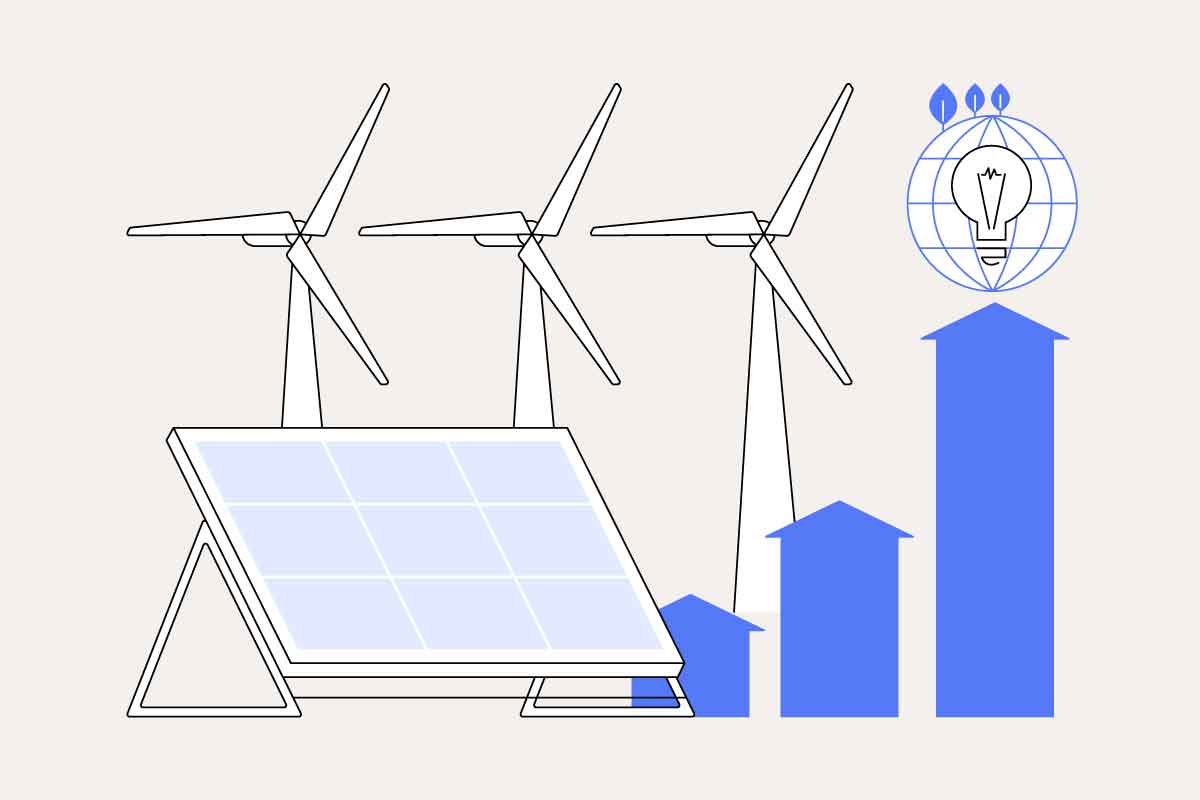Good Energy is a well-known name in the UK energy sector, particularly for its focus on renewable energy solutions. For businesses that prioritise sustainability, Good Energy offers a range of business tariffs and features aimed at reducing their carbon footprint while providing competitive pricing. This article provides a comprehensive review of Good Energy business tariffs, prices, and the unique features that set it apart from other providers.
Overview of Good Energy business energy tariffs
Good Energy is dedicated to providing 100% renewable electricity sourced from wind, solar, hydro, and bioenergy. Their business energy tariffs are designed to cater to companies of all sizes, from small enterprises to large corporations. The main tariffs available for business customers include:
- Fixed-rate tariffs: These tariffs lock in the energy price for a specified period, usually ranging from one to three years. Fixed-rate plans offer budget predictability, which is ideal for businesses looking to avoid market fluctuations in energy costs.
- Variable-rate tariffs: With variable-rate tariffs, the cost of energy fluctuates based on market conditions. This type of tariff can be suitable for businesses that are willing to take the risk of potential price increases in exchange for the possibility of lower costs when energy prices fall.
- 100% renewable gas: In addition to electricity, Good Energy also offers renewable gas options for businesses. This involves carbon offsetting or the use of biogas, which supports a greener approach to energy consumption.
Key features of Good Energy business tariffs
Good Energy’s business tariffs are not just about pricing; they come with a range of features designed to support sustainability and energy efficiency:
- 100% renewable electricity: Good Energy ensures that all the electricity supplied to its business customers comes from certified renewable sources. This makes it easier for companies to meet their sustainability goals and reduce their carbon footprint.
- Flexible contract lengths: Good Energy offers a variety of contract lengths, providing businesses with the flexibility to choose the term that best fits their energy needs and budget. Whether a business prefers a short-term commitment or a long-term arrangement, there is an option available.
- Green gas options: Good Energy’s green gas is partially made up of biogas, produced from organic matter, which helps reduce reliance on fossil fuels. The rest of the gas supply is offset through verified carbon reduction schemes.
- Personalised energy solutions: For larger businesses, Good Energy provides bespoke energy solutions that include tailored tariffs, energy efficiency advice, and even options for on-site renewable generation. This level of customisation can help businesses optimise their energy use and control costs.
- Support for self-generators: If your business generates its own renewable energy, Good Energy offers a buy-back tariff, enabling you to sell excess electricity back to the grid. This feature is particularly attractive to businesses investing in solar panels or other renewable energy sources.
Good Energy business prices list
Good Energy’s pricing can vary significantly based on factors such as location, business size, and energy usage. Although exact prices are usually customised, here is an indicative pricing table for Good Energy’s business tariffs to provide a rough idea of what you might expect. Keep in mind that these rates can fluctuate, so it is always best to request a quote for the most accurate pricing.
| Tariff Type | Unit Rate (per kWh) | Standing Charge (per day) |
|---|---|---|
| Fixed-rate electricity | 25p – 32p | 35p – 45p |
| Variable-rate electricity | 24p – 30p | 30p – 42p |
| 100% renewable gas | 6p – 8p | 20p – 30p |
Notes:
- Fixed-rate tariffs generally offer higher unit rates but provide price stability, which is beneficial for long-term budgeting.
- Variable-rate tariffs can vary according to market conditions, which means rates might be lower or higher depending on energy market fluctuations.
- Standing charges cover the cost of maintaining the supply infrastructure, and these fees can differ based on the business’s location and energy provider’s costs.
For an accurate and tailored pricing structure, it’s recommended to contact Good Energy directly or use our business energy comparison tool.
Pros and cons of choosing Good Energy for your business
Pros
- Sustainability focus: Good Energy’s commitment to providing 100% renewable electricity is a significant advantage for businesses aiming to operate sustainably and reduce their carbon emissions.
- Flexible contract options: With both fixed-rate and variable-rate tariffs available, Good Energy offers flexibility to suit different business needs and risk tolerances.
- Green gas alternatives: The availability of biogas and carbon offset options is a plus for companies looking to minimise their environmental impact across both electricity and gas supplies.
- Customisable solutions: Larger businesses benefit from personalised energy plans and advice on energy efficiency, which can lead to cost savings and improved sustainability practices.
Cons
- Pricing transparency: Good Energy’s pricing is not always as transparent as some competitors. Businesses may need to request a quote to get specific details, which can slow down the decision-making process.
- Higher rates for renewables: While renewable energy tariffs are a great choice for sustainability, they can sometimes be priced higher than traditional energy tariffs, which may deter cost-conscious businesses.
- Limited availability of green gas: Although Good Energy provides renewable gas options, the percentage of biogas in the supply is still relatively low compared to the entire gas offering, with the remainder relying on carbon offsets.
Comparing Good Energy business prices with competitors
Good Energy’s focus on sustainability can sometimes mean its prices are higher than those of traditional energy providers. However, when comparing business energy tariffs, it’s essential to consider the added value of renewable energy and the potential long-term savings from reduced carbon costs and enhanced corporate responsibility.
Businesses that prioritise green credentials may find that the slight premium on Good Energy’s tariffs is offset by the reputational benefits and potential for future savings through energy efficiency initiatives. Furthermore, fixed-rate contracts help mitigate the impact of market volatility, providing stability in energy costs over time.
Is Good Energy the right choice for your business?
Good Energy is a strong contender for businesses that are serious about sustainability and willing to invest in renewable energy solutions. Its tariffs and features are designed to support environmentally responsible practices, making it a suitable choice for companies looking to align their energy consumption with green values.
However, if budget is the primary concern, it may be worthwhile to compare Good Energy’s prices with those of other green energy providers or explore fixed-rate options that offer more predictable costs. Businesses that do not prioritise sustainability might find more cost-effective alternatives with providers that do not focus solely on renewables.
Conclusion – Good Energy business prices review
Good Energy offers a compelling range of business energy tariffs that cater to companies seeking to reduce their carbon footprint through 100% renewable electricity and green gas options. While the costs may be slightly higher than standard energy tariffs, the benefits of sustainability, flexible contract options, and bespoke solutions make it a valuable choice for eco-conscious businesses.
When considering Good Energy as your business energy provider, weigh the importance of sustainability against your budget constraints and long-term energy goals. For companies that view green energy as a priority, Good Energy’s offerings are well worth the investment.
For more, visit the Good Energy website, and see our guides to cheap business gas and electricity.
FAQ – Good Energy business pricing
Good Energy’s green gas currently consists of up to 10% biogas, with the remainder offset through certified carbon reduction projects. This percentage aims to increase as biogas production becomes more prevalent, supporting a greener alternative for businesses looking to lower their carbon footprint.
Yes, Good Energy offers businesses up to 25% savings for investing in on-site renewable energy generation projects like solar panels or wind turbines. These savings come from reduced energy bills and the ability to sell excess electricity back to the grid through their buy-back tariffs.
For businesses on fixed-rate contracts, Good Energy’s termination fee can range from £20 to £150, depending on the remaining contract length and energy usage. Early termination fees are in place to cover any financial losses incurred due to the early exit from the agreed terms.
Good Energy’s buy-back tariff for excess energy can pay businesses between 5p and 8p per kWh. The actual rate depends on market conditions and the amount of renewable energy generated, making it an attractive option for businesses producing their own electricity.
Good Energy offers fixed-rate contracts up to 5 years for business customers. Longer contracts typically provide more stable pricing, with unit rates generally starting from 25p per kWh, ensuring that businesses can avoid the impact of energy market fluctuations over a more extended period.

